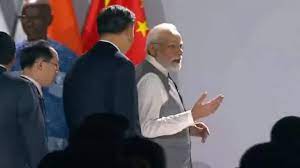Chinese President Xi to PM Modi: “Border Issue Should Be Handled Properly” and “Improving India-China Relations Serve Common Interests”
According to Chinese President Xi Jinping, strengthening bilateral ties serves the interests of both nations. He also emphasized the need of properly resolving border problems for peace and calm in border regions.
On the margins of the BRICS Summit in Johannesburg, South Africa, Xi and Modi spoke with each other. The two presidents agreed to urge authorities to step up efforts at “expeditious disengagement and de-escalation” after discussing the India-China military stalemate in Eastern Ladakh. India and China have been involved in a stalemate in Eastern Ladakh since 2020. While the forces have retreated in certain areas, there are still tension hotspots and broader deescalation is still needed.
Since the impasse started, Xi and Modi have spoken to one another twice. The two presidents discussed the impasse outside the G20 Summit in Bali, Indonesia, last year. The Indian government did not recognise the meeting until this month.
On the fringes of the BRICS Summit on Wednesday, Xi and Modi engaged in a “candid and in-depth exchange of views” on contemporary China-India ties as well as other topics of shared interest, according to a statement from the Chinese Embassy in New Delhi.
According to the statement, Xi emphasized to Modi during their chat that bettering India-China ties serves the interests of both nations.
According to the statement, “President Xi highlighted that bettering China-India ties serves the mutual interests of the two countries and peoples and is also helpful to global peace, stability, and regional development. In order to jointly protect peace and serenity in the border area, the two sides should keep in mind the overarching goals of their bilateral ties and address the border problem effectively.
Vinay Kwatra, the Indian Foreign Secretary, had earlier said that Modi had brought up India’s concerns on outstanding problems along the de facto Line of Actual Control (LAC) in the Western Sector of the India-China border regions. Eastern Ladakh is referred to as the Western Sector of the India-China border territories in official language.
The preservation of peace and calm in border regions, as well as adhering to and respecting the LAC, are crucial for the normalization of ties between India and China, according to Kwatra.Two leaders agreed to instruct their respective authorities to step up efforts for prompt disengagement and deescalation in this regard.
Since Chinese forces invaded Indian territory and engaged Indian troops in combat in early 2020, China and India have been engaged in a military stalemate in Eastern Ladakh. After the first confrontations, many thousands of people as well as war-waging tools including artillery, tanks, and fighter planes were hurried into the area. When 20 Indian troops and an undetermined number of Chinese soldiers were killed in a fight in Galway Valley on June 15, 2020, the situation worsened. Indian-Chinese ties took a severe hit as a result of the event.
Since the start of the stalemate, multiple rounds of negotiations between military and diplomatic representatives have taken place, and forces have left certain regions, but other issues of contention have not been settled. In the lack of normality, between 50 and 60,000 troops are still stationed in the area.
The Chinese administration wants to keep the border issue distinct from the rest of the relationship, but the Narendra Modi government insists that peace and calm at the border is the foundation of the bilateral relationship. The Modi administration claims that the Ladakh impasse has brought the India-China relationship to its lowest point since 1962, when India and China fought a war that India lost, and that the situation at the border has “eroded strategic trust and the public and political basis of the relationship”.
A government statement quoted National Security Advisor (NSA) Ajit Doval as saying that the situation at the border “eroded strategic trust” and the public and political basis of the relationship when he met with top Chinese diplomat Wang Yi on the sidelines of a BRICS meeting in South Africa on July 24. In order to eliminate obstacles to the restoration of normality in bilateral relations, the statement further stressed the necessity of continuing efforts to properly settle the issue and restore peace and tranquility in the border regions, according to PTI.
At a meal at the G-20 Summit in Indonesia last year, Modi and Xi discussed the need to stabilize bilateral ties, according to a statement from the Ministry of External Affairs (MEA) last month. Up until this month, no one recognized the encounter.







